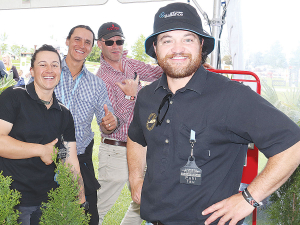Coby Warmington wins 2025 Ahuwhenua Young Māori Farmer Award
Coby Warmington, 29, a farm manager at Waima Topu Beef near Hokianga was named at the winner of the 2025 Ahuwhenua Young Maori Farmer Award for sheep and beef.
 On show (left to right): Young Maori Farmer of the Year finalists Chloe Butcher-Herries, Rameka Eli Edwards, Aaron Hunt (judge) and Puhirere Te-Akainga Tamanui Tau interact with the crowd at the Hawke’s Bay A&P Show.
On show (left to right): Young Maori Farmer of the Year finalists Chloe Butcher-Herries, Rameka Eli Edwards, Aaron Hunt (judge) and Puhirere Te-Akainga Tamanui Tau interact with the crowd at the Hawke’s Bay A&P Show.
"It's a privilege and honour."
That’s how the winner of the 2022 Ahuwhenua Young Māori Award for sheep and beef competition Chloe Butcher-Herries describes her win.
Butcher-Herries is an assistant farm manager at Newstead Farms in Puketapu, near Napier.
She was presented the award by the Māori Trustee Dr Charlotte Severne at the recent Ahuwhenua Trophy awards dinner in the Hawke’s Bay. The event attended by more than 800 people including the Ministers of Agriculture and Māori Development, other politicians, diplomats, dignitaries, agribusiness leaders and whānau.
The two other finalists in the competition were: Puhirere Te-Akainga Tamanui Tau, from Whangara Farms, located near Tolaga Bay and Rameka Eli Edwards, from Te Kuiti.
In presenting the winner’s trophy, Severne noted she was floored by the amazing skill and promise of all the finalists. In an unprecedented move, Severne inducted all three finalists into the AYMF alumni, an honour usually reserved for just the winner, saying this year she made an exception because of the calibre of all three finalists.
“All of you three amazing finalists could fill a successful career in farming, proving an ongoing willingness to learn and a commitment to your craft,” she explained.
“You are an inspiration for rangatahi and others looking to enter this industry.”
Butcher-Herries says her legs were shaking on the stage waiting for the announcement as she had no idea who might be chosen.
She says winning the award is amazing and that her only expectation in entering was to return to her Māori roots and be appreciated for what she was doing on-farm.
“This has been a long journey and it’s opened up a few things for me and my wife,” she told Rural News. “The world is our oyster but farming is my passion and career so I’ll absolutely be staying in the farming industry.”
One of the award judges, Aaron Hunt, representing Te Tumu Paeroa, says the standard of entrants was very high and the three finalists were all exceptional young people. He believes this reflects the number of young Māori who are making successful careers in sheep and beef.
As part of the judging process, the finalists attended an intensive three-day study tour designed to provide a range of insights, inspiration and experiences across the sheep and beef sector. This included a visit to Gwavas Station, a property owned by previous finalist in the senior Ahuwhenua Trophy competition.
The finalists also attended the Hawke’s Bay A&P show and met with a range of business leaders along with Māori leaders involved in the sheep and beef sector. A feature of this day was attending the AFFCO sponsored ‘Best of the Bay competition’, which saw local farmers having their lamb and beef steaks judged by a panel of experts.
The Young Maori Farmers got into the act by helping to hand out samples of the BBQ’d food in the A&P members tent to members of the public, who also took part in the judging process. Their attendance at the show was also part of the judging process; the three finalists interacted with the crowd and the judges kept a close eye on how they were doing.
Voting has started for the renewal of DairyNZ's milksolids levy.
The most successful catchment groups in NZ are those that have 'a source to sea' approach.
Associate Agriculture Minister and Manawatu dairy farmer Andrew Hoggard says the free trade agreement (FTA) negotiated with India is not a bad deal and his party, Act, will support it when it goes before Parliament.
Newly released data from Environment Canterbury (ECan) Farm Environment Plan (FEP) audits are showing a dramatic lift in environmental performance across the region.
A solid recovery of global dairy prices this year makes a $9.50/kgMS milk price almost a shoo-in for this season.
As New Zealand marks the United Nations’ International Year of the Woman Farmer 2026 (IYWF 2026), industry leaders are challenging the misconception that women only support farming.

OPINION: Here w go: the election date is set for November 7 and the politicians are out of the gate…
OPINION: ECan data was released a few days ago showing Canterbury farmers have made “giant strides on environmental performance”.